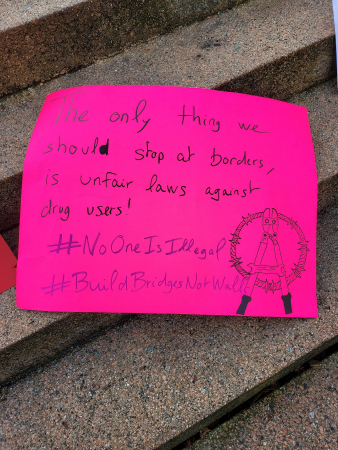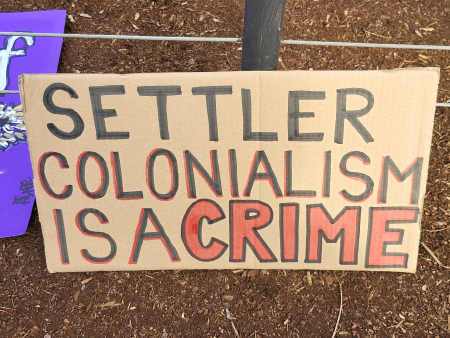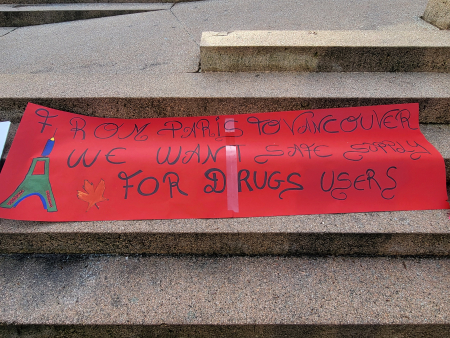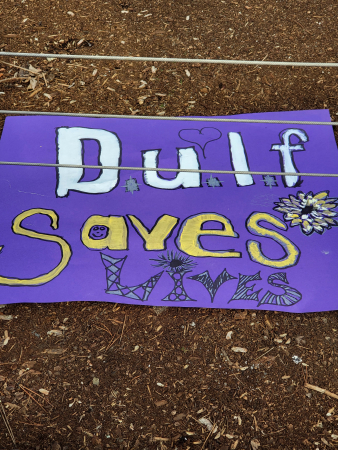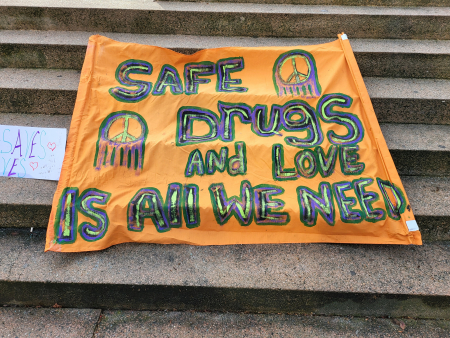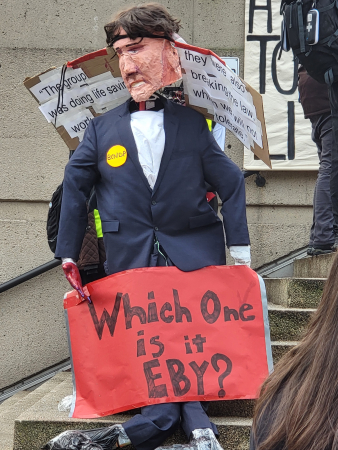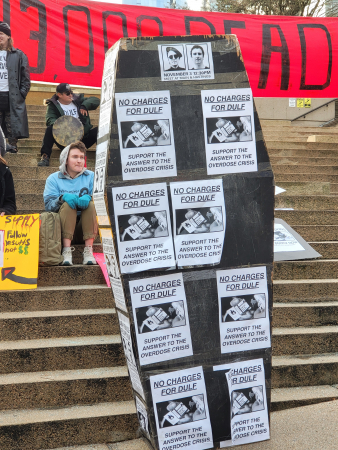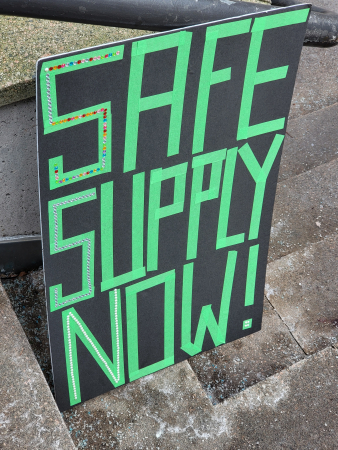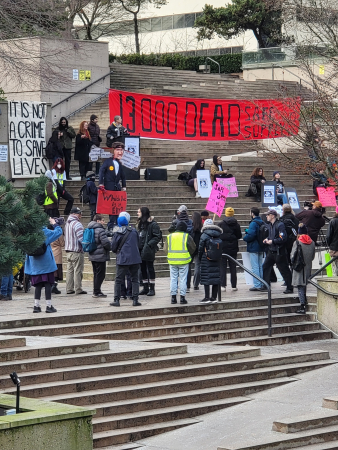Opposing police repression of drug user liberation organizers
Opposing police repression of drug user liberation organizers
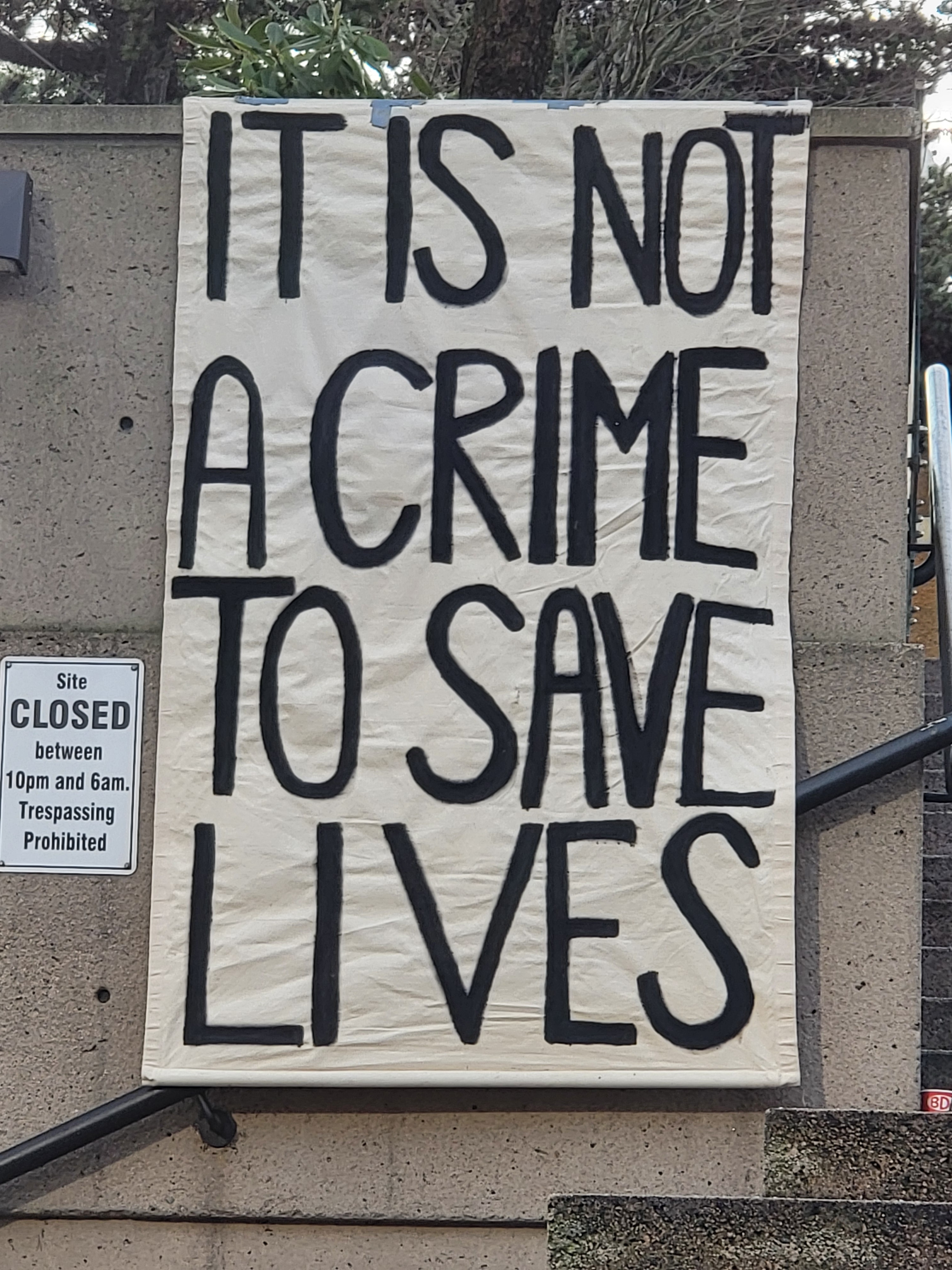
On January 16 more than 200 people rallied at the Vancouver courthouse in support of Drug User Liberation Front (DULF) co-founders Jeremy Kalicum and Eris Nyx, and called for all state charges against them to be dropped. This was part of an international day of action in solidarity with DULF which also saw actions in Nelson, BC; Calgary, AB; Dublin, Ireland; and, London, England. Voices were raised against the policing and criminalization that make drug users' lives more precarious — and which themselves kill people. Instead, participants called for a safe supply of drugs, compassion clubs, and an end to repression against those who provide them.
The Raids and Arrests
The Vancouver Police Department (VPD) raided the homes of Jeremy Kalicum and Eris Nyx and arrested them on October 25, 2023. This was part of a repressive assault that also saw the VPD shut down DULF’s compassion club. This was a disastrous act of social murder which instantly cut off provision of a safe and tested supply of drugs to over forty people. DULF did rigorous testing on drugs to assure their safety.
The arrests came in the midst of a poisoned drug crisis that has taken over 13,000 lives since the crisis was formally recognized by government eight years ago. Critics of the VPD, courts, and the government have stressed that shutting down a recognized life-saving service in the middle of a crisis is beyond callous — it is dehumanizing and deadly.
Social democratic (NDP) Premier David Eby said, hypocritically and egregiously, “It’s unfortunate because they were providing essential life-saving work. But they were also breaking the law, which we will not tolerate.” Advocates characterized this as a stunning admission in which the province’s government leader cold-heartedly put legal formalism over lives of people who use illegal drugs, and argued that if you have ever wondered about the banality of evil behind state social murder, here it was on full display.
While the government has condemned the souring of drugs from illegal “dark web” sources, that same government has also refused to provide a legal safe supply outside of limited prescriptions. Before leaving the position in frustration last year, BC’s chief coroner Lisa Lapointe dismissed the legality argument, saying, “If you see someone in a burning house, it is somewhat justified to smash a window.”
DULF also had $200,000 of funding from Vancouver Coastal Health cut off after a moral panic pitched to fever levels by cop turned politician Elenore Sturko who had been the Surrey RCMP spokesperson for years before becoming an elected Member of the Legislative Assembly (MLA).
The Vancouver Rally
The January 16 rallies were held to coincide with the first scheduled court appearance for Kalicum and Nyx. The Vancouver event was organized by the DULF Solidarity Committee, a grassroots coalition formed after the raids and arrests. They are building a broad working class-based international campaign to build safe supply and compassion club initiatives and to see the charges and repression against DULF ended.
Speakers at the Vancouver rally included longtime organizer Garth Mullins, who stressed the worsening political situation and danger of reactionary politicians like Pierre Poilievre and Sturko: “The government cries crocodile tears for us. They invent a Ministry of Addictions, so they can cry crocodile tears or us. But now it’s getting worse — there is now a backlash, people are running for office on the platform of scapegoating us.”
Pete Woodrow of the Surrey Union of Drug Users spoke about the dire situation in Surrey, BC, where Sturko is based. Often overlooked, Surrey is “a capital of overdose death and the neglect of people who use drugs.” Notably, the City of Surrey has long targeted drug users in the city, even using bylaw enforcement to shut down a self-organized drug users’ space.
UBC Med student Elaine Hu pointed to a recent study found that “people with opioid use disorder are 61% less likely to die after receiving safe supply only once per day.” Hawkfeather Peterson added, “We find what we need in this world to be the best people we can be, even when this means that we need medicines to survive.”
Vancouver Area Network of Drug Users (VANDU) board member Jon Braithwaite noted that “due to prohibition and the drug war, heroin is now hard to find, it’s all fentanyl. Benzos have also changed the supply in ways that are unpredictable and deadly.”
VANDU organizer Vince Tao affirmed, “It is a moral responsibility to break unjust laws, and that is what we do every day we fight for harm reduction.” As many signs and banners at the rally put it, “It is not a crime to save lives.”
In the end, the court appearance was cancelled. Crown prosecution is seeking more time to determine whether they have a substantial chance for conviction. Others would argue there is no public interest in pursuing a prosecution, a key factor Crown is supposed to consider.
As rally participants stress, ending the drug wars, fighting for safe supply, decriminalization, and compassion clubs are working-class, indeed class-struggle, issues — issues that disproportionately impact Black people, Indigenous people, poor people, disabled people; issues of life and death.
Jeff Shantz is a long-time anti-authoritarian organizer, researcher, and writer who lives and works on Kwantlen, Katzie, and Semiahmoo territories (Surrey, British Columbia).
